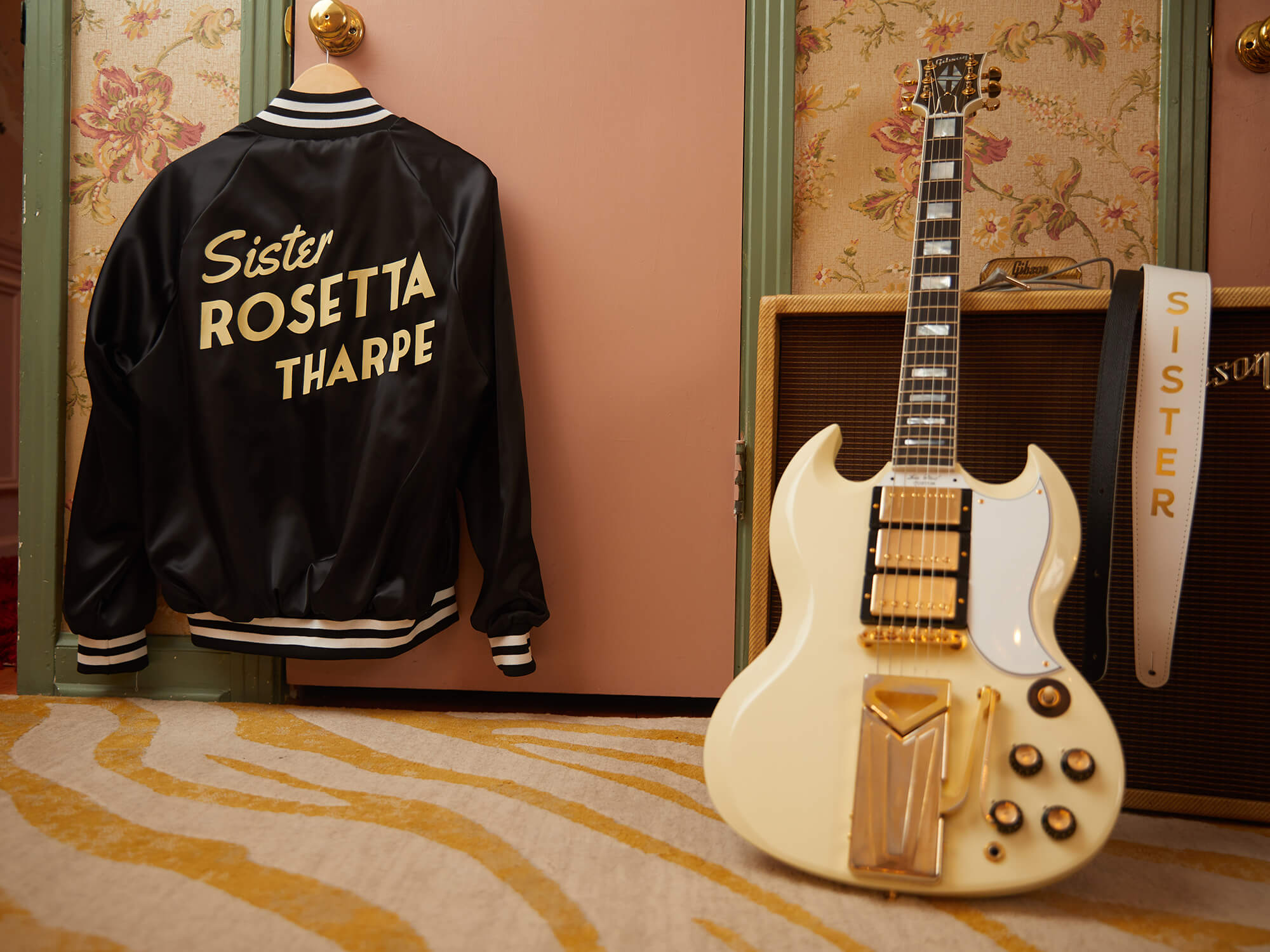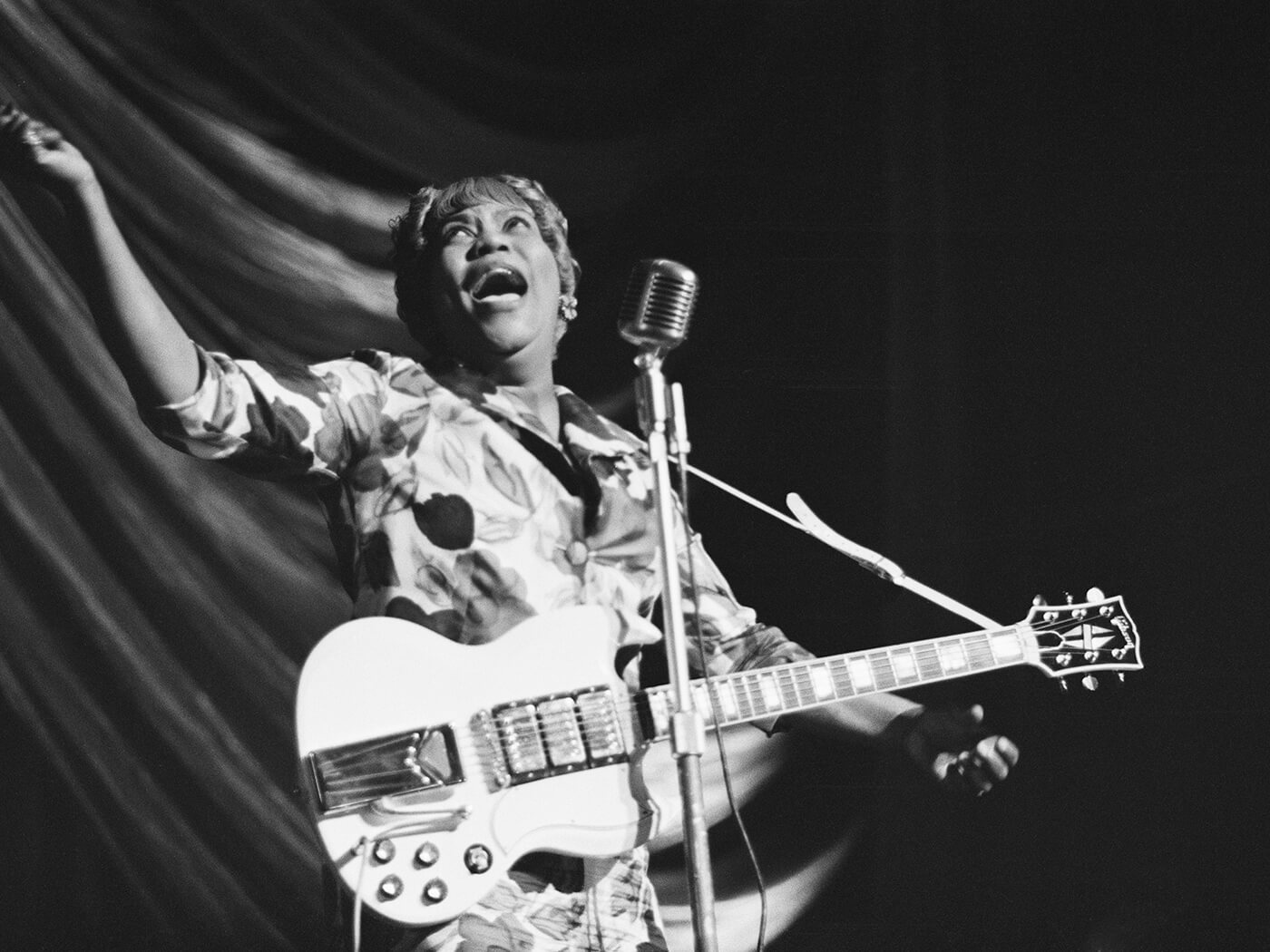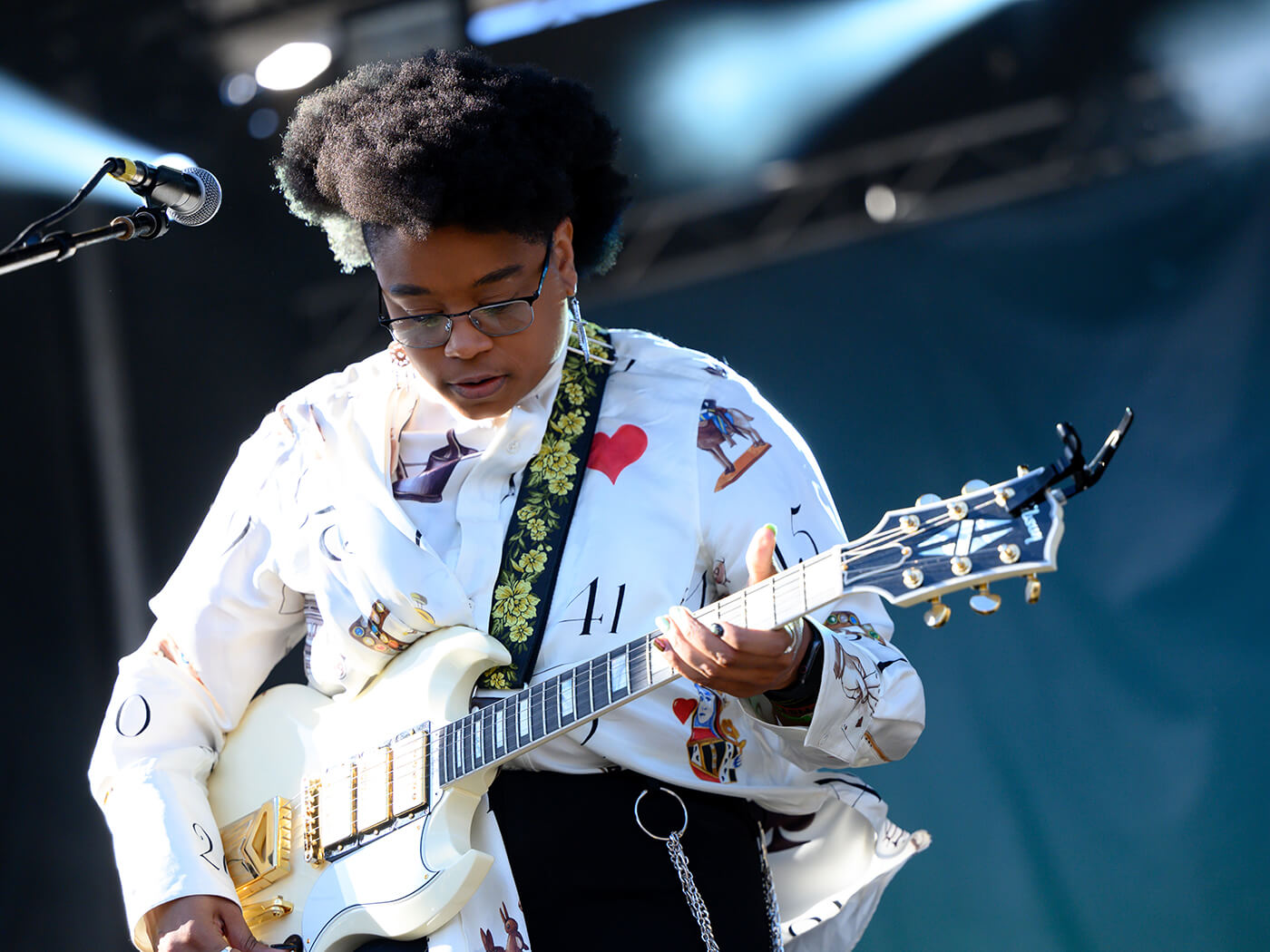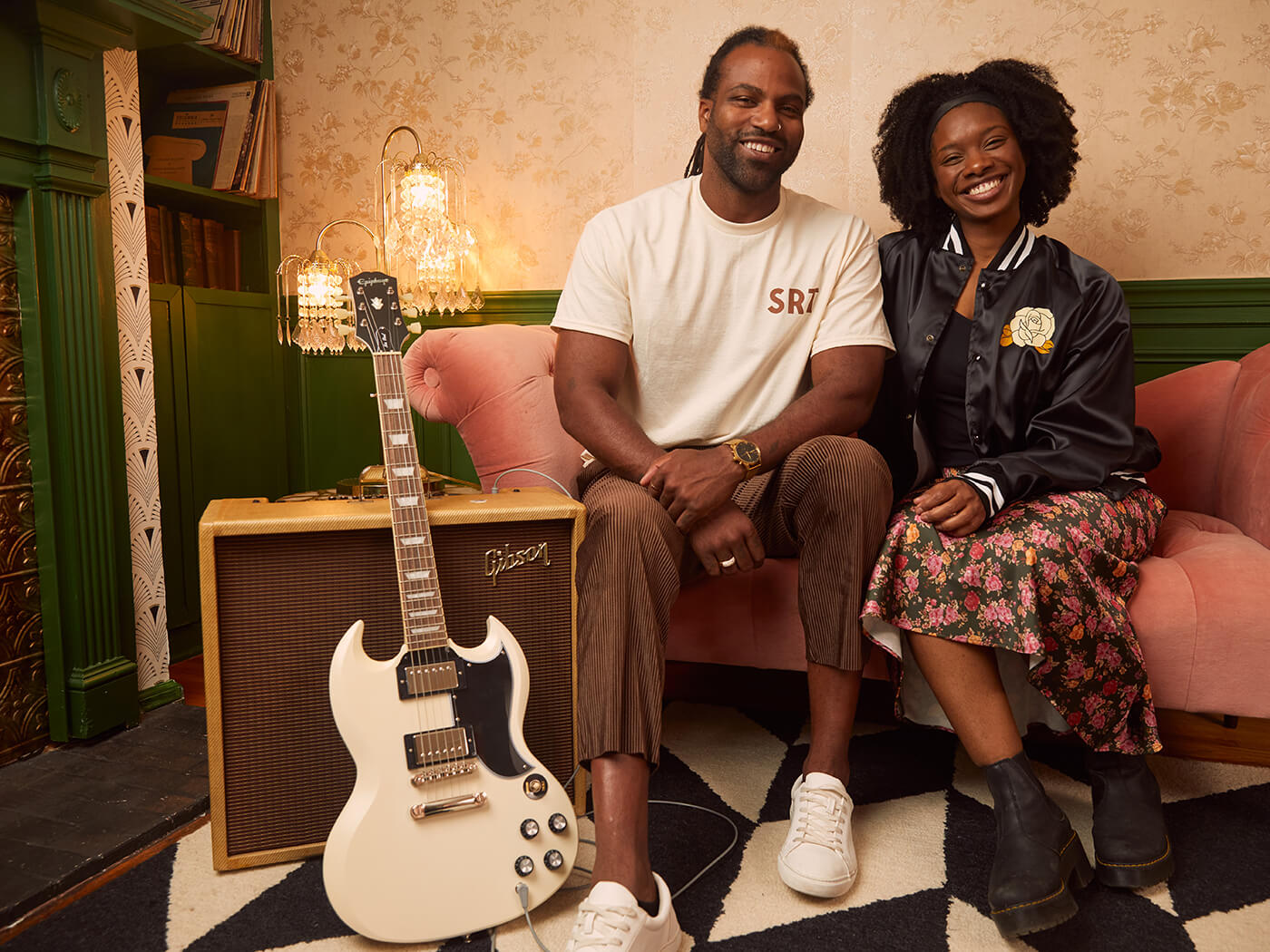Related Tags
Celebrating Sister Rosetta Tharpe: The founding Godmother of guitar
Gibson has teamed up with Amythyst Kiah and Celisse Henderson to celebrate the legacy of Sister Rosetta Tharpe, known for playing a dazzling ’61 Les Paul SG and inspiring the likes of Elvis Presley and Muddy Waters.

Image: Press
When you think of the original rock ’n’ roll artists, who springs to mind? Is it Chuck Berry? Muddy Waters? We’re quick to debate who the true father of rock ’n’ roll was. In reality, there was no founding father at all. Instead, there was the gospel-singing, guitar-playing godmother, the sensational Sister Rosetta Tharpe.
One of the first women to front her own band at a time when women of colour had no voice, Sister Rosetta Tharpe married gospel with rock ’n’ roll and bewitched crowds with her rich vocals and fearless passion. Her vibrance, courage and talent make her one of the all-time greats, yet her legacy remains little-known.
Known for playing a stunning 1961 Gibson Les Paul SG Custom, Tharpe toured the US’s Jim Crow south during a period rife with racism – and despite not being allowed a hotel room. Today we view the tourbus as a symbol that someone has truly ‘made it’. But back when Tharpe was on the road, she had no choice but to sleep on her own bus.
As a queer Black woman, Tharpe has been overlooked as one of the true innovators of rock ’n’ roll – but it’s never too late to give credit where it’s due.

Shout, sister!
Now, Gibson has teamed up with the Sister Rosetta Tharpe estate to remake her ’61 SG and cement the legacy of this godmother of guitar. Accompanying the guitar’s release, Gibson has also produced a line of Tharpe merchandise, as well as Shout, Sister, Shout!, a short documentary in which roots artist Amythyst Kiah and broadway bombshell Celisse Henderson celebrate the artist.
Both Kiah and Henderson cite Tharpe as one of their chief inspirations and, as Black women guitarists, they believe that sharing the legacy of this rock ’n’ roll legend is vital to inspiring the next generations of upcoming guitarists.
Henderson first stumbled on Tharpe via YouTube. “I first stopped on the clip because she looked so much like my grandmother,” says Henderson. “When you’re listening to the style, you start to connect the dots of how this woman was the bedrock of not only rock ’n’ roll music but the foundation of so many pieces of what we have in modern music today. I became really obsessed and wanted that ’61 custom white SG.”
Having discovered the clip of Tharpe’s Up Above My Head at about the same time she was learning electric guitar, Henderson says she has Sister Rosetta to thank for inspiring her to explore the instrument further.
“She epitomised everything a rock ’n’ roll god really is – but she looked like me. We owe a huge set of gratitude to this woman.”

Representation matters
Amythyst Kiah found Tharpe via the same video. “That image of this very refined church lady holding this amazing-looking SG, which we all look at as synonymous with rock ’n’ roll, and seeing her play with such joy and passion, it really blew me away,” Kiah tells us.
“I grew up in a predominantly white area so all of the people that I’ve ever looked up to when it came to guitar had been either white men or white women, and I don’t think there’s anything inherently wrong with that but when you couple that with all the other media imagery during that time, which focused on euro-sentric beauty and not other ways of being, it created a self-esteem problem for me. Seeing a Black woman totally shredding it on guitar was something I had never seen before.”
Kiah released her album Wary And Strange in 2021, and plans to play in the UK this summer and autumn. The record explored her issues with confidence and her history of what she describes as ‘self sabotage’.
“I was carrying around unresolved grief about the suicide of my mother,” she tells us. “I didn’t realise I was doing it but I threw myself completely into music and the academic world in a way to save me from myself. We need to remember as much of this history as we possibly can, because having that knowledge can help inform somebody who may have doubts [about themselves]. Representation matters because not everybody has the same foundations to start from.”

Freedom of expression
Henderson released her own empowering song, Freedom, following the killing of George Floyd, as a call to stand up and fight for Black lives. After learning about Tharpe’s legacy, the guitarist realised that playing is her “birth right”.
“The privilege that I have to get on stage and play music for people, to sing for people, it’s not something I take lightly,” Henderson says. “And when I think of the sacrifices that came before me to give me the ability to do that, I always want to make sure that people are leaving a performance of mine feeling lifted and fed in some way. It feels like paying forward what I’ve gotten by watching so many of my heroes whose shoulders I stand on.”
Alongside the short doc Shout, Sister, Shout!, as part of Gibson’s Sister Rosetta Tharpe campaign the brand produced a performance of her track Didn’t It Rain featuring Henderson and Kiah.
“We met the day before we filmed,” says Henderson. “We didn’t know each other before then. We had a great time. It felt like a really powerful thing for both of us to be playing electric guitar and to be carrying on the legacy of not only Sister Rosetta but Marie Knight.”
“There’s been this increase in conversations happening around Americana and country music and recognising Black contributions,” adds Kiah. “I’ve never played with another Black female guitarist before, that’s never happened! It felt like a full-circle moment for both of us from two different backgrounds, coming together connected by a vision of a person who is not what would be expected as the poster child of rock ’n’ roll. It’s about your attitude. If you’re coming to the table with confidence, that’s rock ’n’ roll to me.”

Keeping Sister Rosetta alive
Sister Rosetta Tharpe loved her ’61 SG. Henderson’s gear, it turns out, isn’t much different. “I play a 1963 Custom SG,” she says. “The same pickups, the same hardware. The only real difference is, instead of the sideways vibrola, it’s the maestro vibrola. I play through a fantastic amp made by Benson amps [called] the Vincent. I’m always getting my distortion right from the amp.”
For Kiah, meanwhile, Gibson’s replica Tharpe Les Paul SG has become a new favourite. “My number-one is the SRT Les Paul. It’s truly amazing,” she says, before outlining her setup. “I bounce back and forth between a Fender Hot Rod Deluxe and a Vox. For pedals I’ve got an Electro-Harmonix Big Muff and I recently picked up a JHS chorus pedal. I’ve got a Suhr Jack Rabbit tremolo pedal and an EarthQuaker Devices Plumes distortion.”
Henderson and Kiah continue to lace their music with that Sister Rosetta flair. The pair also work to lift up other artists who deserve a bigger platform, dubbing guitarists Ari O’Neal and Jackie Venson “phenomenal”, and artist Jody Friend, of the Indianapolis band Public Universal Friend, “a great songwriter”.
Henderson paid tribute to Tharpe back in 2019 when she played for pop artist Lizzo during the latter’s Saturday Night Live performance. Henderson donned the white SG Custom, adorned with a guitar strap that read “sister”, and plucked along to the melody of Truth Hurts in true Sister Rosetta style.
There’s still a long way to go in terms of recognising the enormous contributions of Black artists to the rich history of guitar.
“If you look at any genre and it’s all white, all male, all cis and all hetero, you can guarentee there’s holes in that story because people from all kinds of backgrounds have been involved in all sorts of music form the very beginning,” says Henderson. “When you’re listening to a rock ’n’ roll artist, really listen and think about how the influences of those guitarists are so often Chuck Berry and Muddy Waters. But there’s a direct line to Sister Rosetta Tharpe, who set it up for us all.
“What we can all do is keep this woman alive by continuing to bring her name up in conversation when we’re talking about the importance of who gave us the music that we have today.”
For more features, click here.
